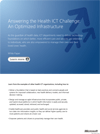
Information and communications technology (ICT) can lead the industry toward an interconnected health platform by delivering an optimized technology infrastructure that combines traditional, cloud-based, and hybrid computing models. This infrastructure will pull together the disparate parts of the health ecosystem, thereby enabling better care, workforce mobility, and security-enhanced data-delivery models.
The new technology infrastructure will also enable patients and citizens to securely access information to proactively manage their own health.
An optimized infrastructure will provide ICT with a cost-effective way to manage systems and ensure security, compliance, and reliability. This goal is achievable using a common management and development platform that provides common identity and incorporates familiar tools and existing technologies; works across virtually all cloud and non-cloud locations; and incorporates capabilities that are specific to health organizations' concerns.
Through common identity and tools that work across public cloud, private cloud, and hybrid platforms, health organizations have more options than ever for providing data access to patients and care providers while still protecting personal health data.
Download Answering the Health ICT Challenge: An Optimized Infrastructure (.pdf, 499 KB).
Download from eHealthNews.eu Portal's mirror: Answering the Health ICT Challenge: An Optimized Infrastructure (.pdf, 499 KB).
Related news articles:
- Microsoft's Profile
About Microsoft in Health
Microsoft is committed to improving health around the world through software innovation. Over the past 13 years, Microsoft has steadily increased its investments in health with a focus on addressing the challenges of health providers, health and social services organisations, payers, consumers and life sciences companies worldwide. Microsoft closely collaborates with a broad ecosystem of partners and delivers its own powerful health solutions, such as Amalga, HealthVault, and a portfolio of identity and access management technologies acquired from Sentillion Inc. in 2010. Together, Microsoft and its industry partners are working to deliver health solutions for the way people aspire to work and live.
About Microsoft
Founded in 1975, Microsoft (Nasdaq "MSFT") is the worldwide leader in software, services and solutions that help people and businesses realise their full potential.